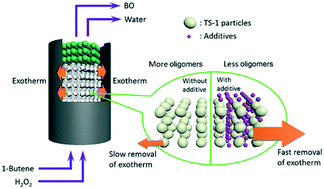Highly stable TS-1 extrudates for 1-butene epoxidation through improving the heat conductivity†
Abstract
The epoxidation of olefins is strongly exothermic, which not only impacts negatively on the epoxide selectivity and catalytic stability, but also threatens safety in manufacturing processes. With the aim of accelerating the removal of exothermic heat, TS-1 extrudates were prepared by introducing different substances with high heat conductive rates (carborundum, copper and iron) to the extrusion mixture. The catalysts were characterized and used to catalyze 1-butene epoxidation in a fixed-bed reactor. Compared to traditional extruded catalysts, the new catalysts exhibit outstanding high stability, due to the inhibition of side reactions by rapid removal of exothermic heat. The influence of each additive content on the catalytic performance was studied. Furthermore, the relationship between the heat conductivity of the catalyst and the stability for 1-butene epoxidation was established. It shows that a higher heat conductivity leads to better stability of the catalyst. This work paves a new way for improving the stability of strong exothermic reactions.



 Please wait while we load your content...
Please wait while we load your content...